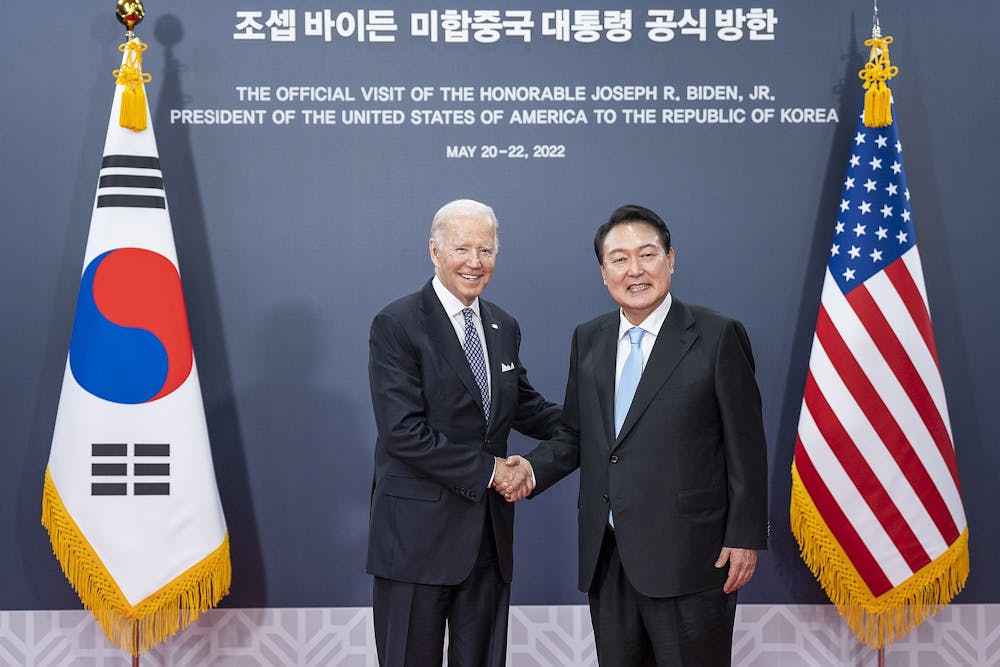By Gauri Patel
Staff Writer
On April 25, President Joe Biden welcomed South Korean President Yoon Suk Yeol and his wife, first lady Kim Keon Hee, to the White House for an official state visit, according to AP News. This visit marks the 70th anniversary of the U.S. alliance with South Korea, highlighting the close ties between the two nations.
According to a statement from White House Press Secretary Karine Jean-Pierre, the state visit will underscore the U.S.’ unwavering commitment to the alliance with South Korea.
“The upcoming visit celebrates the 70th anniversary of the U.S.-South Korea alliance, which is critical to advancing peace, stability and prosperity for our two countries, the Indo-Pacific, and around the world,” Jean-Pierre said in the statement.
Yoon and his administration have made strengthening the U.S.-South Korea alliance a key priority in foreign policy, similar to Biden, who made a symbolic visit to Seoul as his first stop on his inaugural trip to Asia as president in May 2022.
This alliance grows increasingly important in the context of escalating North Korean aggression. According to Reuters, North Korea has increased its military provocations with its development of weapons, testing its first solid-fuel intercontinental ballistic missile in early April. This technology would be a significant step forward for its missile program if developed successfully.
Recent attempts by Biden at holding talks between the U.S. and North Korea over its nuclear and missile programs have been ignored by North Korean leader Kim Jong Un. Dialogue with North Korea has been at a stand-still since former U.S. President Donald Trump abruptly ended the 2019 Hanoi summit with Kim without an agreement on a denuclearization deal, according to NPR. Since then, North Korea has accelerated its development of new nuclear weapons in an effort to pressure the U.S. into making concessions first.
On April 26, Biden and Yoon announced a new agreement aimed at deterring the ongoing provocations from North Korea, according to CNN. The leaders made the decision to strengthen extended deterrence, a policy that states that the U.S. has the commitment to use the full range of military capabilities to deter and respond to potential nuclear and non-nuclear scenarios in defense of allies.
“Our two countries have agreed to immediate bilateral presidential consultations in the event of North Korea’s nuclear attack and promised to respond swiftly, overwhelmingly and decisively using the full force of the alliance including the United States’ nuclear weapons,” Yoon said at a joint press conference
The agreement, called the “Washington Declaration,” outlines a set of new steps that will boost cooperation between the U.S. and South Korea through military training, sharing information and strategic asset movements, according to CNN. This includes enhancing the visibility of the U.S.’ strategic assets in the South Korean region through the deployment of a nuclear submarine in South Korea for the first time since the early 1980s.
The establishment of the U.S.-South Korea Nuclear Consultative Group, modeled after U.S. engagement with European allies during the Cold War, is a key feature of the agreement. The group will convene regularly to discuss issues related to nuclear and strategic planning, according to the Department of Defense.
Recent online leaks of classified documents from the Pentagon, however, may complicate Yoon’s visit to the U.S., according to CNN. One of the leaked documents describes a detailed conversation between two top South Korean national security advisors about concerns over a U.S. request for ammunition to support the war effort in Ukraine. They are worried that supplying the ammunition would violate a South Korean policy of not supplying lethal weapons to countries at war. One of the officials suggested a way to circumvent the policy without changing it, which was by sending the ammunition to Poland first.
Despite the security leaks, Biden reassured the public that the U.S.’ commitment to the security partnership with South Korea remains “ironclad.”
“The alliance formed in war and has flourished in peace,” Biden said during the press conference. “Our mutual defense treaty is ironclad, and that includes our commitment to extend a deterrence.”










